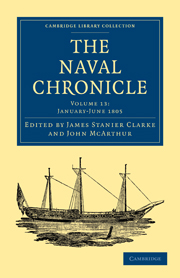 The Naval Chronicle
The Naval Chronicle Book contents
- Frontmatter
- PLATES IN VOLUME XIII. From Original Designs
- PREFACE TO THE THIRTEENTH VOLUME
- BIOGRAPHICAL MEMOIR OF LIEUTENANT WILLIAM HUNTER, OF GREENWICH HOSPITAL: An intimate Friend of the Poet FALCONER
- BIOGRAPHICAL MEMOIR OF THE LATE COMMODORE SIR WILLIAM JAMES, BART. IN THE HON. EAST INDIA COMPANY'S SERVICE, Chairman of the Court of Directors, &c
- BIOGRAPHICAL MEMOIR OF PHILIP D'AUVERGNE, DUKE OF BOUILLON, COMMODORE IN HIS MAJESTY'S SERVICE, &c. &c
- BIOGRAPHICAL MEMOIR OF ADMIRAL SIR RICHARD ONSLOW, BART
- BIOGRAPHICAL MEMOIR OF SIR RICHARD BICKERTON, BART. AND K.C. REAR-ADMIRAL OF THE RED SQUADRON
- BIOGRAPHICAL MEMOIR OF RICHARD RODNEY BLIGH, ESQ, ADMIRAL OF THE BLUE SQUADRON
- BIOGRAPHICAL MEMOIR OF RICHARD RODNEY BLIGH, ESQ. ADMIRAL OF THE BLUE SQUADRON
- INDEX
- I SPANISH NAVAL STATE PAPERS
- II SPANISH NAVAL STATE PAPERS
BIOGRAPHICAL MEMOIR OF ADMIRAL SIR RICHARD ONSLOW, BART
Published online by Cambridge University Press: 10 January 2011
- Frontmatter
- PLATES IN VOLUME XIII. From Original Designs
- PREFACE TO THE THIRTEENTH VOLUME
- BIOGRAPHICAL MEMOIR OF LIEUTENANT WILLIAM HUNTER, OF GREENWICH HOSPITAL: An intimate Friend of the Poet FALCONER
- BIOGRAPHICAL MEMOIR OF THE LATE COMMODORE SIR WILLIAM JAMES, BART. IN THE HON. EAST INDIA COMPANY'S SERVICE, Chairman of the Court of Directors, &c
- BIOGRAPHICAL MEMOIR OF PHILIP D'AUVERGNE, DUKE OF BOUILLON, COMMODORE IN HIS MAJESTY'S SERVICE, &c. &c
- BIOGRAPHICAL MEMOIR OF ADMIRAL SIR RICHARD ONSLOW, BART
- BIOGRAPHICAL MEMOIR OF SIR RICHARD BICKERTON, BART. AND K.C. REAR-ADMIRAL OF THE RED SQUADRON
- BIOGRAPHICAL MEMOIR OF RICHARD RODNEY BLIGH, ESQ, ADMIRAL OF THE BLUE SQUADRON
- BIOGRAPHICAL MEMOIR OF RICHARD RODNEY BLIGH, ESQ. ADMIRAL OF THE BLUE SQUADRON
- INDEX
- I SPANISH NAVAL STATE PAPERS
- II SPANISH NAVAL STATE PAPERS
Summary
“Laughing at Toil, and gay in Danger's face.”
PyeSir Richard Onslow, Bart. is the second son of Richard, brother to Arthur Onslow, Esq. a gentleman of considerable celebrity in the annals of the British Parliament. He in some measure may be considered as possessing an hereditary claim to consequence in his profession; for his mother was the daughter of Charles Walton, Esq. and niece to the well-known Admiral Sir George Walton.
Mr. Onslow commenced his Naval Career at a very early period of life. His first appointment, as Lieutenant, bears the date of December 17, 1758. On the 11th of February, 1761, he was advanced to the rank of Commander in, we believe, the Martin Sloop; and on the 14th of April, 1762, he was made Post in the Humber, a forty-gun Ship.
Shortly after Captain Onslow's appointment to the Humber, he sailed in that Ship, to convoy the outward-bound Baltic Fleet. On his return to England, in the month of September, with a similar charge, the Humber unfortunately ran upon the south end of the Haysborough Sands, and was entirely lost. Several of the Convoy had the misfortune to ground also; but their Crews and Cargo were saved, as was the whole Crew of the Humber, one Man only excepted.
As a matter of course, Captain Onslow's conduct was regularly investigated before a Court Martial, which acquitted him in the most honourable manner.
- Type
- Chapter
- Information
- The Naval ChronicleContaining a General and Biographical History of the Royal Navy of the United Kingdom with a Variety of Original Papers on Nautical Subjects, pp. 249 - 336Publisher: Cambridge University PressPrint publication year: 2010First published in: 1805


